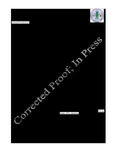In vitro Propagation of Date Palm Cultivars Magdoul and Safwai through Somatic Embryogenesis

Date
2020-10-10Author
Metadata
Show full item recordAbstract
The success of genetic conservation, cloning and possible genetic transformation requires an effective micropropagation protocol in vitro. For date palm (Phoenix dactylifera L.), there seems to be a lot of reported genotypic variation influencing optimum in vitro protocols. Two different cultivars of date palm Safawi and Magdoul were investigated to establish efficient protocol for callus induction, somatic embryogenesis, shoot proliffaration in vitro and plant acclimization ex vitro. The highest value of callus induction and relative water content (RWC) was reached at 25.0 mg L-1 2, 4-D and 5.0 mg L-1 2iP; 10 mg L-1 2, 4-D and 8.0 mg L-1 2iP for cvs. Safawi and Magdoul, respectively. The highest percentage of callus producing somatic embryos were 92.25% and 96.18% obtained on MS medium fortified with 6.0 mg L-1 2iP with 1.0 or 3.0 mg L-1 NAA for cvs. Safawi and Magdoul, respectively. High root formation occured on 2 and/or 2.5 mg L-1 NAA alone or with of 0.5 mg L-1 IBA. Regenerated plantlets were successfully acclimatized ex vitro with a 55-70% survival rate. The present article gives an update of the current approaches of date palm micropropagation with emphasis on the plant regeneration through somatic embryogenesis. It highlights key factors that influence in vitro differentiation and evaluated somatic embryos from embryogenic lines established from two cultivars with respect to their ability to germinate and be converted into plantlets.
Collections
Journal
Volume
Issue
Pagination
Recommended, similar items
The following license files are associated with this item:

